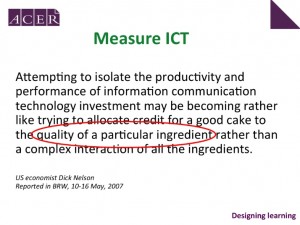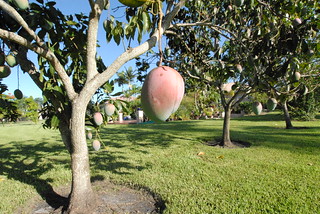On Monday, I heard Dylan William say that computers don't make a difference to learning in the classroom. On Thursday, I heard Gerry White say that technology is responsible for a 12% increase in achievement. Both asserted that their statements were backed by research.
Dylan William said on Monday (and Friday), "You are entitled to your own opinions. You are not, however, entitled to your own facts."
John Hattie said something similar back in 2011 when he was in Adelaide, "I'm sorry but you can't argue with the research."
Over time, we as educators have become used to listening to and reading from gurus with simple truths. So many of us feel that we are well below the expertise of these edugurus (and I don't mean to single out the examples above as being the only ones going around) so we pack into venues, feverishly copying dot points from slideshows, handing over cash to buy the book and match up the dispensed wisdom against our own learning, our own classrooms and schools to see if we are headed in the prescribed direction. I am guilty as anyone of being part of this phenomenon but it is interesting how connecting to lots of non-edugurus has helped me spot the mixed messages and view this dispensed wisdom through a more critical (some might say cynical) lense.
Another example from Monday. When I first arrived at my previous school, there were a few teachers who were using the Brain Gym program pushed by a teacher who considered himself an expert on the matter of brain research. He had attended Brain Gym training, had gone to other Brain based PD (quite popular about ten years ago) but something about the whole program didn't sit right with me. I got some evidence that this was so when Ewan McIntosh published a blog post in 2007 that queried some of the bogus science and research that was at the core of the program. He was of course being informed by others in his network, so he published further posts and pointed to the growing evidence. But if back in 2007, I told those devotees of Brain Gym of Ewan's findings, I would have been scoffed at.
"What would some blogger know about Brain Gym? He's not an expert. It's based on up to date brain research."
So I kept my mouth shut. But then Dylan William canned Brain Gym on Monday as well. Suddenly, teachers knew for sure that it was bogus, because an authoritative voice had said so. Not one of their colleagues, not some mysterious blogger from Scotland but someone who is currently viewed by our Australian educational community as an expert. We, as educators, are so conditioned to the notion that our knowledge isn't expert enough, that our day to day experiences aren't enough to grasp the bigger picture that we concede the higher factual ground to those on the stage or behind the podium.
Don't get me wrong. This is not a post against people like Dylan William or John Hattie who bring us their research, their findings and their advice. What they bring to us via their research, their books and their presentations is extremely valuable. But I hope that as you sit in a keynote with a phone, tablet or laptop that connects you to the motherlode of information, the internet, you have enough faith in yourself to conduct some research of your own. Confront the mixed messages, don't take the word of any guru as gospel, and look for the truths that emerge as you do so.
Just think of it as a form of information literacy.



